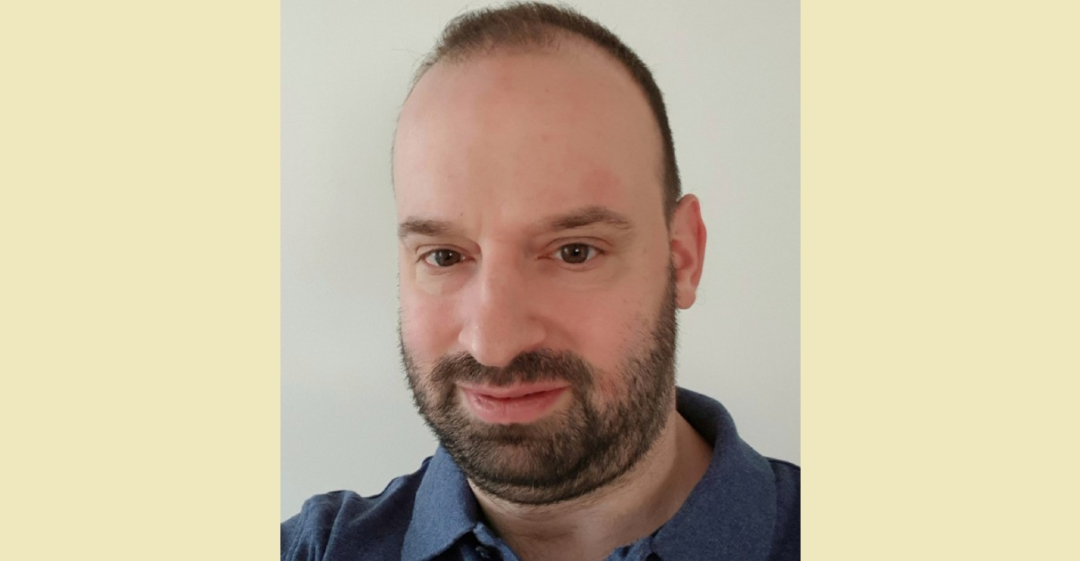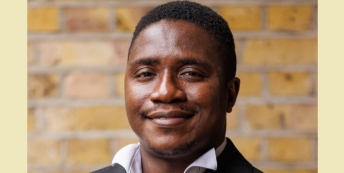“I wasn’t fulfilled in what I was doing, and had felt like that for a long time.”

What work were you doing previously?
My first career was business analysis and product management in IT, mostly in financial services and a little bit in advertising.
What are you doing now?
I’m working for the London Ambulance Service as an assistant ambulance practitioner, on the path to becoming a full paramedic.
Why did you change?
I call it a midlife crisis.
Fundamentally I knew I wasn’t fulfilled in what I was doing, and had felt like that for a long time. My job didn’t feel to me like I was making any important difference to real people’s lives. I kind of sum it up as being “fed up with making rich people richer”.
Alongside my professional career I had a successful 25-year voluntary career with a suicide helpline charity. Somehow the original deal of making money working and doing something worthwhile in my free time no longer seemed to be sufficient.
When was the moment you decided to make the change?
After being made redundant during the pandemic, I knew I needed to do something different, but had no idea how to work out what.
Here I was a middle-aged man still clueless about what he wanted to do when he grew up.
Are you happy with the change?
I’m massively happy with the change.
I love helping people. I strangely love shift work too. I love being at work when others aren’t and vice versa.
On top of that I’m not stuck at a desk, I’m out and about and every shift really is different.
This is a job where I knew and prepared myself to see some of the harder things in life, with seeing trauma, suffering and the darker side of what humans can do to each other.
It was a surprise though that I get to see the best of humanity too: neighbours looking out for each other, friends and relatives caring for each other, advocating, and of course the ordinary stranger just stopping for a person in need.
I get to see some of this good everyday I go to work. It’s great.
What do you miss and what don't you miss?
The main thing I miss is many of the fantastic people I had the pleasure of working with previously, although I’d been missing them anyway from jobs I’d already left.
I don’t miss the 9-5 (or usually longer), or the commute.
I don’t miss having projects weighing on my mind when I’m not working.
I don’t miss arbitrarily set artificial deadlines used to create urgency and to over-drive people to work.
How did you go about making the shift?
I’d had this idea for a long time that if I was financially secure and had sufficient capital, I’d set up and run a care home.
I’d been inspired by watching a couple of TV shows around 15 years ago, including The Young Ones.
It took aging celebrities and locked them away in an isolated house, with all the trappings of how life was about 30 years earlier when they were in their prime to see if they would recover some of their independence, which they did.
So I knew working in health and social care was something that I was interested in. One of the avenues I explored during my career shift I was care. I worked as a carer, mainly with learning difficulties and traumatic brain injuries.
During this work I got exposed to all sorts of different roles in health and social care – other carers, social workers, speech therapists, physios, occupational therapists along with doctors and nurses.
The idea of working for the ambulance service was there in the background, however as with many of the options I was coming across, I understood that it required doing a degree.
I wasn’t against doing a degree but I knew I had to be sure it was really what I wanted to do before embarking on such a commitment. I couldn’t afford to get that decision wrong.
One afternoon I got home after work having driven past the hospital and seen ambulance workers having a smoke. That prompted a conversation with my daughter, and I asked her if she knew any paramedics from back from her nursing days.
She was then able to put me in touch with a friend of hers who had also career shifted from the airline industry to the London Ambulance Service and had followed this apprenticeship path of earning while you are learning.
My conversation with my daughter’s friend was great and everything after that just slotted into place.
How did you develop (or transfer) the skills you needed for your new role?
The great thing about this apprenticeship pathway is that the entry requirements into the role were low.
It was just GCSE English & Maths or the equivalent, and a provisional C1 driving license. Everything else they’re going to teach.
That said, when I spoke to my daughter’s friend about what made a good paramedic, she had said that being able to talk to people was the most important thing.
My voluntary experience has been invaluable here.
What didn’t go well? What wrong turns did you take?
The main mistake I made was a common one that lots of people make.
It was that I thought, if only I had the time I’d be able to think and ponder about the problem of what it was that I wanted to do, and I’d be able to figure it out.
But that’s not how it works, it’s not something you can figure out in your own head.
How did you handle your finances to make your shift possible?
I didn’t have to think about money too much, I was already not working and living off my savings.
I guess I was hugely fortunate to have savings. Also going from earning nothing to earning anything meant that getting the experience of caring doing a minimum wage job had an upside.
I was fortunate also regarding my family situation. With kids grown up it meant that I could consider a wide variety of jobs across the income range.
What was the most difficult thing about changing?
The hardest thing about this shift was believing that the path was leading somewhere.
The search for a new role threw up many different fascinating avenues to explore, but at times it was difficult to believe that any of it would lead to a role that would both pay and be fulfilling.
What help did you get?
The main help I got was by doing the High Flyers course with Careershifters, which I took to give me a framework and support to explore.
A massive thank you to the Careershifters team and the support of my course mates who were on the journey with me.
I’m also really blown away by the generosity of all the people (too numerous to mention) that I spoke to about what their jobs and roles involve.
And thank you to my wife for patiently putting up with me as I walked the path of the shift.
What have you learnt in the process?
Being fulfilled is far more important than financial reward.
At the same time, there is little regret about the path that led me to here. There’s no sense that the job I’m doing now is what I should have always been doing, or that the career I was in before was a mistake.
I don’t know whether this is the job I will be doing till I retire but it’s right for me now.
What do you wish you'd done differently?
When I look back, I kind of wish I’d been able to take the steps to investigate my career shift about five years earlier when my confidence in myself was much greater.
The niggle about wanting to do something different had been there for a long time, but inertia was keeping me from shifting.
What would you advise others to do in the same situation?
If the feeling of being unfulfilled is there for you, then this is something to act on.
Don’t just stick inside your own head thinking you can work it out. Talk to people, and talk open-mindedly. Casting the net wide about what makes other people tick and listen to what resonates and excites you.
Joshua took part in our High Flyers' programme. If you’re a high performer in your career, feel there’s something missing, and are ready to discover some exciting viable options for ‘what next’, you can find out more here.
What lessons could you take from Joshua's story to use in your own career change? Let us know in the comments below.



